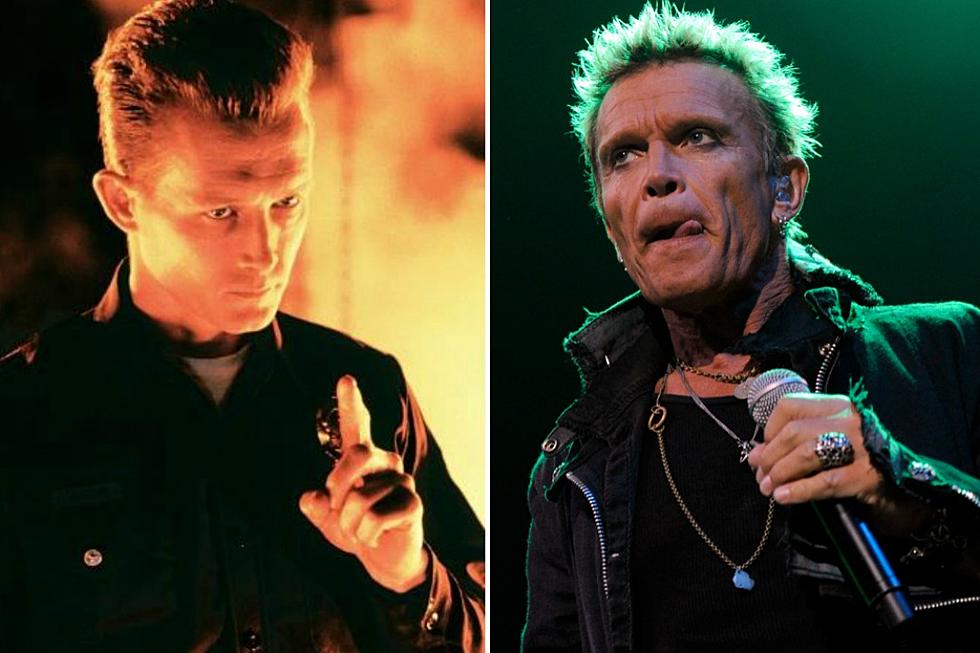
30 Years Ago: Billy Idol’s Ambitious ‘Cyberpunk’ Fails to Connect
This spoken-word prologue kicked off Billy Idol's sixth studio LP: "All information should be free. It is not. Information is power and currency in the virtual world we inhabit. So mistrust authority. Cyberpunks are the true rebels. Cyber culture is coming in under the radar of ordinary society ... "
Cyberpunk, a 20-track concept album, took Idol's world-famous persona and multi-platinum sound and attempted to bring them into the '90s – both in terms of the lyrical subject matter, which focused on futuristic themes, and in terms of the computer-driven production methods used to create the music.
Released on June 29, 1993, a little more than three years after Idol's million-selling Charmed Life album, Cyberpunk was one of the more heavily promoted major music events of the summer, with multiple videos filmed for the single "Shock to the System" and a groundbreaking electronic press kit shipped to critics on floppy disk.
For Idol, using the computer as a studio tool became something of an obsession after the motorcycle accident that left him with a badly broken leg in early 1990.
"I wanted to get back to my punk rock roots and DIY," he explained in an interview following Cyberpunk's release. "First I read William Gibson’s Neuromancer, then I found out a Virtual Studio where I could bring a computer into my home and record my band with it. ... It was like being in a garage band once again."
Watch Billy Idol's 'Shock to the System' Video
That DIY vibe not only helped revitalize Idol's songwriting spirits, it gave him the chance to – in his view – offer a rebuttal to the grunge fad of the early '90s.
"I threw off the shackles of the past," he explained to Entertainment Weekly. "I was looking for a way to break the stalemate I'd gotten into, which was boring me to death, really. This is in a way my sort of answer to grunge. I know there's a way of using this modern technology to bring a lot of rawness back."
He was even clearer about his urge to remain relevant when speaking with the New York Times: "It's 1993. I better wake up and be part of it. I'm sitting there, a 1977 punk watching Courtney Love talk about punk, watching Nirvana talk about punk, and this is my reply. It's just my own way of saying, 'Wooo! What about that? Hey, I'm Lollapalooza too! I'm the cyberpunk; you guys are still punks!'"
Unfortunately for Idol, all that enthusiasm – not to mention a heavy promotional campaign that included a video for "Shock to the System" directed by effects guru Stan Winston (Terminator 2) – didn't seem to translate to the music, which inspired widespread indifference and/or derision. In fact, he found himself beset by criticism from all sides.
Take a Tour of Billy Idol's 'Cyberpunk' Floppy Disk
Members of the nascent Internet community felt like Idol was trying to co-opt their culture for his own gain, while rock pundits accused him of writing subpar material for the album. Finally, his fans more or less ignored Cyberpunk completely.
Gibson, whose 1984 novel helped inspire Idol's Cyberpunk journey, hinted at the cultural disconnect that probably doomed the project from the beginning.
"I just don't get what he's on about. I don't see the connection," Gibson later admitted when asked about the album. "A London journalist told me when Billy did his Cyberpunk press junket over there, he made it a condition of getting an interview with him, that every journalist had to have read Neuromancer. ... Anyway, they all did but when they met with Billy, the first thing that became really apparent was that Billy hadn't read it. So they called him on it, and he said he didn't need to. ... He just absorbed it through a kinda osmosis. I don't know."
"Shock to the System" was a minor hit, cresting at the upper reaches of Billboard's Mainstream Rock chart. But the album barely cracked the Top 50 then fell off the Top 200 in less than two months, bringing a quick, undignified end to Idol's promotion plans for the record. It was a shame, because whatever the music's merits, Idol's genuine excitement for the technology pointed the way toward a lot of the recording, production, and promotion methods that would come to dominate the record industry in the decades to follow.
Watch Billy Idol's 'Adam in Chains' Video
"We're going to be lit by these stream-of-consciousness images," Idol enthused to the New York Times when asked about his ideas for a Cyberpunk tour. "It's going to almost be like that's your mind. And we'll have four people swarming the gig with camcorders, which then will be put live into this blend. And people from the audience can bring their filmed footage – God knows, them with their girlfriend, I don't know! And then we'll put it up on the screen.
"I think you have to start looking to get to the future of what rock 'n' roll concerts should be like," Idol added. "We're working; we're pushing the technology to the edge."
Ultimately, Cyberpunk would prove to be the death knell for Idol's relevance as a recording artist. His highest-profile project for the remainder of the '90s was a cameo appearance in the Adam Sandler/Drew Barrymore rom-com The Wedding Singer, and he wouldn't release another album of new material until Devil's Playground in 2005.
It's still a stretch to say it includes any of his most memorable songs – or perhaps even that it's all that entertaining as an album – but Idol can at least take comfort in the knowledge that, in a number of ways, Cyberpunk was a record ahead of its time.
Billy Idol Albums Ranked
More From WWMJ Ellsworth Maine










